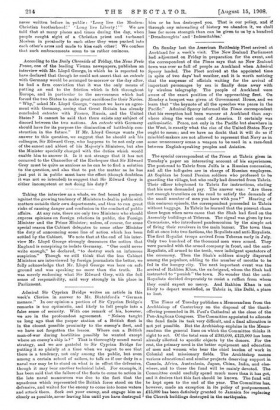Admiral Sir Cyprian Bridge writes an article in this week's
Clarion in answer to Mr. Blatchford's "German menace." In our opinion a portion of Sir Cyprian Bridge's remarks is too optimistic, and likely to lull people into a false sense of security. With one remark of his, however, we are in the profoundest agreement. "Nelson taught us long ago that the proper station of a British fleet is in the closest possible proximity to the enemy's fleet, and we have not forgotten the lesson. Where can a British man-of-war during hostilities possibly be wanted except where an enemy's ship is ? " That is thoroughly sound naval strategy, and we are grateful to Sir Cyprian Bridge for putting it so plainly at a time when we regret to see that there is a tendency, not only among the public, but even among a certain school of sailors, to talk as if our duty in a naval war may be to stand on what is in effect the defensive, though it may bear another technical labeL For example, it has been said that the failure of the fleets to come to action in the late naval manceuvres was due to the fact that the squadrons which represented the British force stood on the defensive, and waited for the enemy to come into home waters and attack them. Seek out your enemy, and engage him as closely as possible, never leaving him until you have destroyed him or he has destroyed you. That is our policy, and if through any misreading of history we abandon it, we shall lose far more strength than can be given to us by a hundred 'Dreadnoughts' and • Indomitables:






































 Previous page
Previous page